Beauty 文章翻译
Beauty(爱默生)译文
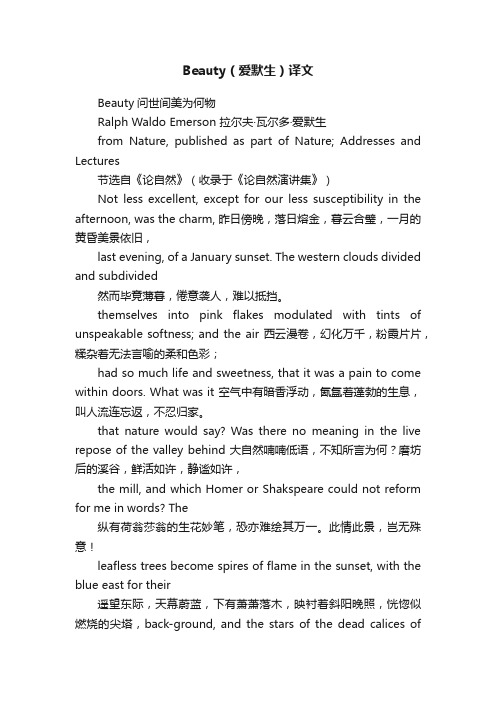
Beauty(爱默生)译文Beauty问世间美为何物Ralph Waldo Emerson 拉尔夫·瓦尔多·爱默生from Nature, published as part of Nature; Addresses and Lectures节选自《论自然》(收录于《论自然演讲集》)Not less excellent, except for our less susceptibility in the afternoon, was the charm, 昨日傍晚,落日熔金,暮云合璧,一月的黄昏美景依旧,last evening, of a January sunset. The western clouds divided and subdivided然而毕竟薄暮,倦意袭人,难以抵挡。
themselves into pink flakes modulated with tints of unspeakable softness; and the air 西云漫卷,幻化万千,粉霞片片,糅杂着无法言喻的柔和色彩;had so much life and sweetness, that it was a pain to come within doors. What was it 空气中有暗香浮动,氤氲着蓬勃的生息,叫人流连忘返,不忍归家。
that nature would say? Was there no meaning in the live repose of the valley behind 大自然喃喃低语,不知所言为何?磨坊后的溪谷,鲜活如许,静谧如许,the mill, and which Homer or Shakspeare could not reform for me in words? The纵有荷翁莎翁的生花妙笔,恐亦难绘其万一。
此情此景,岂无殊意!leafless trees become spires of flame in the sunset, with the blue east for their遥望东际,天幕蔚蓝,下有萧萧落木,映衬着斜阳晚照,恍惚似燃烧的尖塔,back-ground, and the stars of the dead calices offlowers, and every withered stem and 花瓣凋零,点点如繁星坠落,枝茎摧折,残株凝霜,stubble rimed with frost, contribute something to the mute music.这一切,共谱出无声的乐章。
综合英语教程五beauty英汉翻译
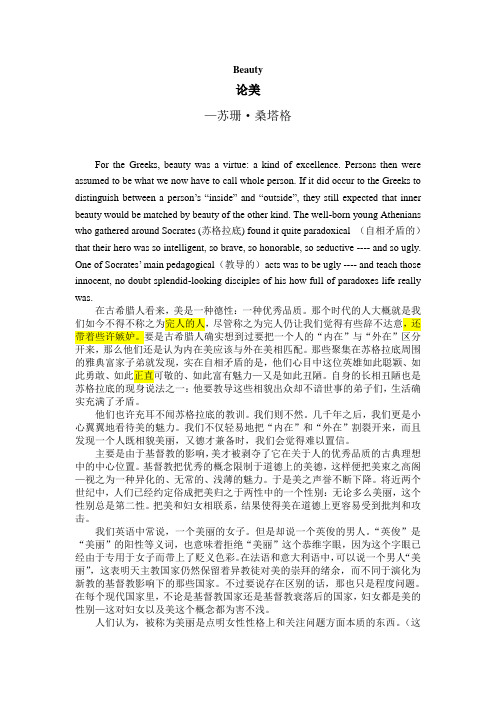
Beauty论美—苏珊·桑塔格For the Greeks, beauty was a virtue: a kind of excellence. Persons then were assumed to be what we now have to call whole person. If it did occur to the Greeks to distinguish between a person’s “inside” and “outside”, they still expected that inner beauty would be matched by beauty of the other kind. The well-born young Athenians who gathered around Socrates (苏格拉底) found it quite paradoxical (自相矛盾的)that their hero was so intelligent, so brave, so honorable, so seductive ---- and so ugly. One of Socrates’ main pedagogical (教导的)acts was to be ugly ---- and teach those innocent, no doubt splendid-looking disciples of his how full of paradoxes life really was.在古希腊人看来,美是一种德性:一种优秀品质。
那个时代的人大概就是我们如今不得不称之为完人的人,尽管称之为完人仍让我们觉得有些辞不达意,还带着些许嫉妒。
要是古希腊人确实想到过要把一个人的“内在”与“外在”区分开来,那么他们还是认为内在美应该与外在美相匹配。
高级英语beauty译文
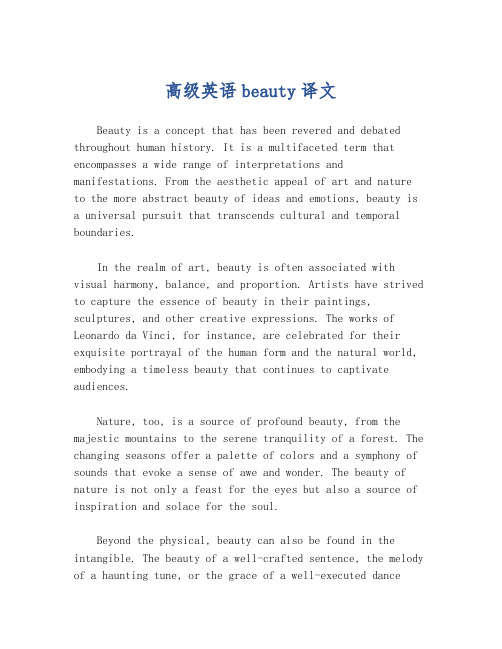
高级英语beauty译文Beauty is a concept that has been revered and debated throughout human history. It is a multifaceted term that encompasses a wide range of interpretations and manifestations. From the aesthetic appeal of art and nature to the more abstract beauty of ideas and emotions, beauty is a universal pursuit that transcends cultural and temporal boundaries.In the realm of art, beauty is often associated with visual harmony, balance, and proportion. Artists have strived to capture the essence of beauty in their paintings, sculptures, and other creative expressions. The works of Leonardo da Vinci, for instance, are celebrated for their exquisite portrayal of the human form and the natural world, embodying a timeless beauty that continues to captivate audiences.Nature, too, is a source of profound beauty, from the majestic mountains to the serene tranquility of a forest. The changing seasons offer a palette of colors and a symphony of sounds that evoke a sense of awe and wonder. The beauty of nature is not only a feast for the eyes but also a source of inspiration and solace for the soul.Beyond the physical, beauty can also be found in the intangible. The beauty of a well-crafted sentence, the melody of a haunting tune, or the grace of a well-executed dancemove all speak to the human capacity for creating and appreciating beauty in its many forms.Moreover, beauty is subjective and personal. What one person finds beautiful may not resonate with another. This diversity in perception is what enriches our understanding and appreciation of beauty. It encourages us to explore, to question, and to appreciate the myriad ways in which beauty can be expressed and experienced.In conclusion, beauty is a complex and ever-evolving concept that touches all aspects of life. It is a testament to the human spirit's ability to find and create beauty in the world around us, and within us. Whether it is in the form of art, nature, or the intangible, beauty enriches our lives and connects us in a shared pursuit of the sublime.。
高英7-beauty-译文
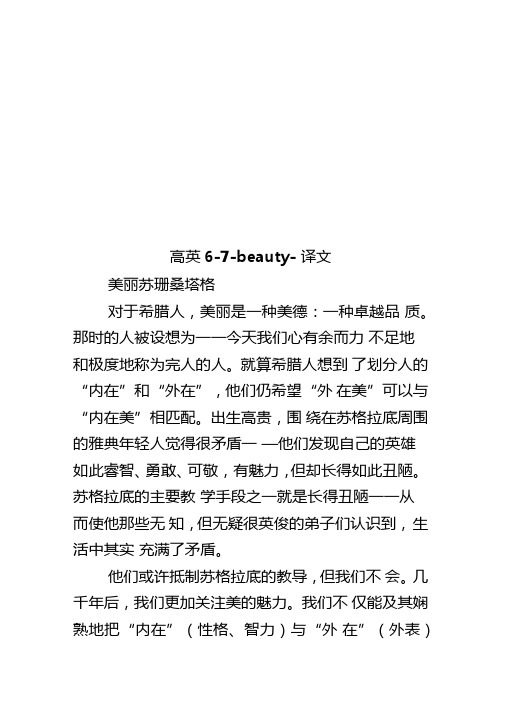
高英6-7-beauty- 译文美丽苏珊桑塔格对于希腊人,美丽是一种美德:一种卓越品质。
那时的人被设想为一一今天我们心有余而力不足地和极度地称为完人的人。
就算希腊人想到了划分人的“内在”和“外在”,他们仍希望“外在美”可以与“内在美”相匹配。
出生高贵,围绕在苏格拉底周围的雅典年轻人觉得很矛盾一—他们发现自己的英雄如此睿智、勇敢、可敬,有魅力,但却长得如此丑陋。
苏格拉底的主要教学手段之一就是长得丑陋一一从而使他那些无知,但无疑很英俊的弟子们认识到,生活中其实充满了矛盾。
他们或许抵制苏格拉底的教导,但我们不会。
几千年后,我们更加关注美的魅力。
我们不仅能及其娴熟地把“内在”(性格、智力)与“外在”(外表)分开,而且实际上,如果什么人很漂亮,同时又睿智、能干而善良,会让我们感到十分惊讶那些。
很大程度上,基督教的影响剥夺了“美丽” 在古希腊罗马人心中关于人类美德理想的中心地位。
基督教把优秀(拉丁文是virtus )仅限制为道的美德,而将美丽看作是一种疏离、随意而肤浅的魅力排除在外。
此外,“美丽”还不断地失去威信。
将近两个世纪以来,把美丽归属于男女两个性别其中之一已经使得美丽在道德上更容易受到攻击。
用英语我们说“美丽的女人”,但却说“英俊的男人”。
“英俊” 一词是“美丽”的阳性同义词也是对"美丽"否定 "美丽"这一恭维因为只用在女人身上而积累了一定的贬损之意。
法语和意大利语可以说男人是“美丽的”,这表明天主教国家(不像那些受基督教新教影响的国家)仍保留着异教徒那种崇拜魅力的遗风。
区别在于(假如区别存在的话)程度不同而已。
在每一个基督化或后基督化的现代国家,女性都是美丽的性别这对于美丽的观念以及女人本身都有损害。
人们认为,称女人美丽是指出了某些东西,它们对于女人的特点和女人关注的事情十分重要。
(相比之下男人一一他们的本质是强壮,或高效、能干。
)并不是挣扎在超前女权主义意识中的人才能觉察到,教导女性去沉溺于美的方式会怂恿自恋,增加依赖和幼稚。
大学英语综合教程5 第十一单元Beauty 翻译
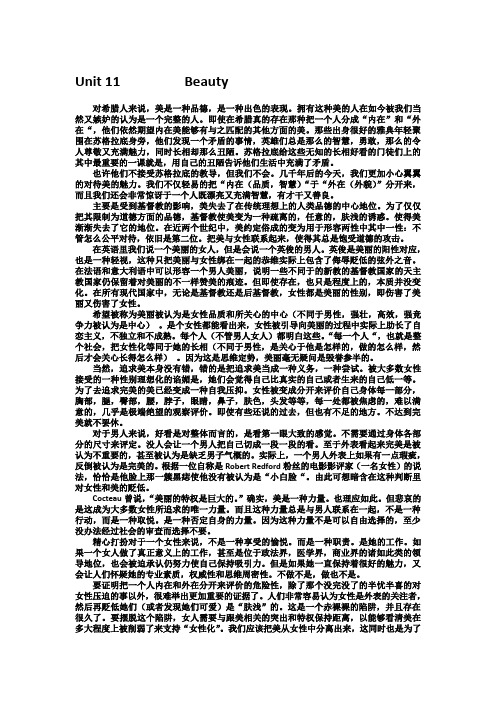
Unit 11 Beauty对希腊人来说,美是一种品德,是一种出色的表现。
拥有这种美的人在如今被我们当然又嫉妒的认为是一个完整的人。
即使在希腊真的存在那种把一个人分成“内在”和“外在“,他们依然期望内在美能够有与之匹配的其他方面的美。
那些出身很好的雅典年轻聚围在苏格拉底身旁,他们发现一个矛盾的事情,英雄们总是那么的智慧,勇敢,那么的令人尊敬又充满魅力,同时长相却那么丑陋。
苏格拉底给这些无知的长相好看的门徒们上的其中最重要的一课就是,用自己的丑陋告诉他们生活中充满了矛盾。
也许他们不接受苏格拉底的教导,但我们不会。
几千年后的今天,我们更加小心翼翼的对待美的魅力。
我们不仅轻易的把“内在(品质,智慧)“于“外在(外貌)”分开来,而且我们还会非常惊讶于一个人既漂亮又充满智慧,有才干又善良。
主要是受到基督教的影响,美失去了在传统理想上的人类品德的中心地位。
为了仅仅把其限制为道德方面的品德,基督教使美变为一种疏离的,任意的,肤浅的诱惑。
使得美渐渐失去了它的地位。
在近两个世纪中,美约定俗成的变为用于形容两性中其中一性:不管怎么公平对待,依旧是第二位。
把美与女性联系起来,使得其总是饱受道德的攻击。
在英语里我们说一个美丽的女人,但是会说一个英俊的男人。
英俊是美丽的阳性对应,也是一种轻视,这种只把美丽与女性绑在一起的恭维实际上包含了侮辱贬低的弦外之音。
在法语和意大利语中可以形容一个男人美丽,说明一些不同于的新教的基督教国家的天主教国家仍保留着对美丽的不一样赞美的痕迹。
但即使存在,也只是程度上的,本质并没变化。
在所有现代国家中,无论是基督教还是后基督教,女性都是美丽的性别,即伤害了美丽又伤害了女性。
希望被称为美丽被认为是女性品质和所关心的中心(不同于男性,强壮,高效,强竞争力被认为是中心)。
是个女性都能看出来,女性被引导向美丽的过程中实际上助长了自恋主义,不独立和不成熟。
每个人(不管男人女人)都明白这些。
“每一个人“,也就是整个社会,把女性化等同于她的长相(不同于男性,是关心于他是怎样的,做的怎么样,然后才会关心长得怎么样)。
大学英语综合教程5 第十一单元Beauty 翻译

Unit 11 Beauty对希腊人来说,美是一种品德,是一种出色的表现。
拥有这种美的人在如今被我们当然又嫉妒的认为是一个完整的人。
即使在希腊真的存在那种把一个人分成“内在”和“外在“,他们依然期望内在美能够有与之匹配的其他方面的美。
那些出身很好的雅典年轻聚围在苏格拉底身旁,他们发现一个矛盾的事情,英雄们总是那么的智慧,勇敢,那么的令人尊敬又充满魅力,同时长相却那么丑陋。
苏格拉底给这些无知的长相好看的门徒们上的其中最重要的一课就是,用自己的丑陋告诉他们生活中充满了矛盾。
也许他们不接受苏格拉底的教导,但我们不会。
几千年后的今天,我们更加小心翼翼的对待美的魅力。
我们不仅轻易的把“内在(品质,智慧)“于“外在(外貌)”分开来,而且我们还会非常惊讶于一个人既漂亮又充满智慧,有才干又善良。
主要是受到基督教的影响,美失去了在传统理想上的人类品德的中心地位。
为了仅仅把其限制为道德方面的品德,基督教使美变为一种疏离的,任意的,肤浅的诱惑。
使得美渐渐失去了它的地位。
在近两个世纪中,美约定俗成的变为用于形容两性中其中一性:不管怎么公平对待,依旧是第二位。
把美与女性联系起来,使得其总是饱受道德的攻击。
在英语里我们说一个美丽的女人,但是会说一个英俊的男人。
英俊是美丽的阳性对应,也是一种轻视,这种只把美丽与女性绑在一起的恭维实际上包含了侮辱贬低的弦外之音。
在法语和意大利语中可以形容一个男人美丽,说明一些不同于的新教的基督教国家的天主教国家仍保留着对美丽的不一样赞美的痕迹。
但即使存在,也只是程度上的,本质并没变化。
在所有现代国家中,无论是基督教还是后基督教,女性都是美丽的性别,即伤害了美丽又伤害了女性。
希望被称为美丽被认为是女性品质和所关心的中心(不同于男性,强壮,高效,强竞争力被认为是中心)。
是个女性都能看出来,女性被引导向美丽的过程中实际上助长了自恋主义,不独立和不成熟。
每个人(不管男人女人)都明白这些。
“每一个人“,也就是整个社会,把女性化等同于她的长相(不同于男性,是关心于他是怎样的,做的怎么样,然后才会关心长得怎么样)。
初中英语日记范文:True Beauty (带中文翻译)
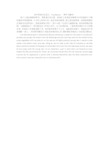
初中英语日记范文:True Beauty (带中文翻译)每个人都会被美所吸引,荚有强大的力量。
但是什么是真正的美呢?兴许你能够从下面的情况中得到答案。
今天早上我和父母一起去市场买蔬菜,路上我们都赞美一具西装革履的正骑车经过的年轻人。
但是他骑得太快了,别小心把一位老妇人撞倒在地。
而他却假装没看到,飞速地骑走了。
我们都生这个年轻人的气。
让人欣慰的是,一具穿着朴素的少女立刻跑过来,扶起老人并把她送回了家。
我们都夸奖那个小少女。
由此我们知道了,别能经过外表来推断一具人。
一具身穿华服的人可能没有美好的心灵,拥有漂亮灵魂的人才是真正漂亮的。
true beautyeveryone is attracted by beauty and beauty is powerful. but what is true beauty? perhaps you can get the answer from the following story.this morning i went to the market to buy some vegetables with my parents. on the way we all highly praised a young man in western-style clothes and leather shoes who was riding by. but he rode so fast that he knocked an old lady down carelessly.instead of stopping, he pretended not to see this and rode away quickly. we were all very angry with the young man. to our happiness, a girl in plain dress ran forward at once, helped the lady up and took her home. we all praised the girl.from this we know we cannot judge a person by his appearance. a person who is dressed beautifully may not have a beautiful soul. only a person who has a beautiful soul is really beautiful.。
Unit 7 Beauty 译文

Unit 7 Beauty美1.对于古希腊人来说,美是一种美德,一种出类拔萃的表现,是那些在今天的我们看来不得不被称为"完人"的人。
如果古希腊人真的能够区分一个人的“内在”和"外在",那么他们仍然要求内在美能够与外在美相匹配.聚集在苏格拉底周围,出身富裕的雅典贵族年轻人发现一个很矛盾的事实,他们的偶像是如此有智慧,有胆识,如此高贵,如此魅力四射,但又如此丑陋。
苏格拉底的一个最主要的教学方式是,用他自己丑陋的外表教导那些天真,无疑也是相貌堂堂的学徒,生活是如此充满矛盾的。
2.也许他们会反对苏格拉底的教导,但我们则不然。
几千年之后的我们比较提防美的诱惑。
我们不仅轻易地区分了内在(性格,才智)和外在(外表),当看到一个外表动人的人还非常有智慧,有才智,有善心时,我们还会非常惊讶。
3.主要是受基督教的影响,美才被剥夺了它在人的优秀品质中的中心位置。
通过将优秀的品质限制为道德上的美德,基督教使偏离了美的概念——认为它是一种异化的,任意的,肤浅的诱惑。
于是美变得没那么动听了。
近两个世纪,美被约定俗成地归为两性中的一个性,不管多么美丽,永远是属于第二个性别的。
把美和女性挂钩之后,美更加受到道德上的批判。
4.我们英语常说,一个美丽的女人,但却说一个英俊的男子。
"英俊”是"美丽"的阳性等义词——是对“美丽"这样的赞美的拒绝,因为这句赞美是专属于女性的,所以便有了贬义的色彩。
在法语和意大利语中可以说一个男子“美丽”,这表明天主教的国家不像那些演化为新教的基督教国家,他们仍然保留有异教徒崇尚美的痕迹。
如果说有区别的话,那也只是程度不同罢了。
在现代,不管是基督教国家还是后基督教国家,说女性属于美丽的性别,这不仅伤害了美丽本身的意义,也对女性造成了伤害。
5.人们认为,被称作美丽是点明女性性格上和关注问题上的某些本质的东西。
(男性则不同-—他们的本质是强大,有效率,有能力)不用经历先进女权主义意识的阵痛就能意识到,教女性将自己与美丽联系在一起,就助长了女性的自我陶醉,加深了其依赖性以及不成熟状态。
新编英语教程6-U7-Beauty-中英翻译
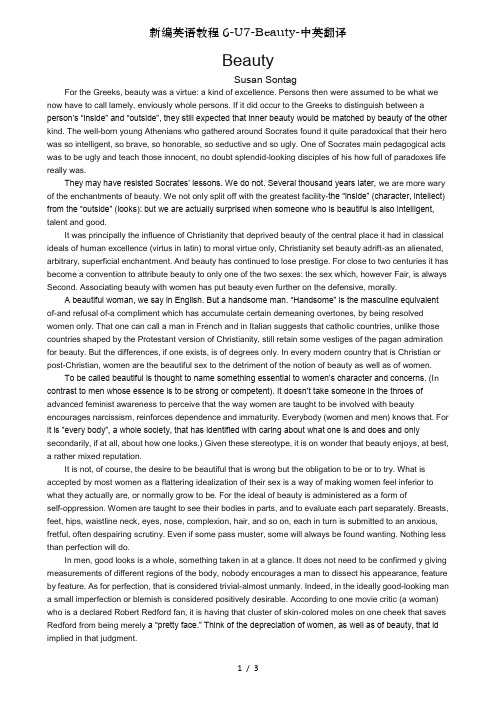
BeautySusan SontagFor the Greeks, beauty was a virtue: a kind of excellence. Persons then were assumed to be what we now have to call lamely, enviously whole persons. If it did occur to the Greeks to distinguish between a person’s “inside” and “outside”, they still expected that inner beauty would be matched by beauty of the other kind. The well-born young Athenians who gathered around Socrates found it quite paradoxical that their hero was so intelligent, so brave, so honorable, so seductive and so ugly. One of Socrates main pedagogical acts was to be ugly and teach those innocent, no doubt splendid-looking disciples of his how full of paradoxes life really was.They may have resisted Socrates’ lessons. We do not. Several thousand years later, we are more wary of the enchantments of beauty. We not only split off with the greatest facility-the “inside” (character, intellect) from the “outside” (looks): but we are actually surprised when someone who is beautiful is also intelligent, talent and good.It was principally the influence of Christianity that deprived beauty of the central place it had in classical ideals of human excellence (virtus in latin) to moral virtue only, Christianity set beauty adrift-as an alienated, arbitrary, superficial enchantment. And beauty has continued to lose prestige. For close to two centuries it has become a convention to attribute beauty to only one of the two sexes: the sex which, however Fair, is always Second. Associating beauty with women has put beauty even further on the defensive, morally.A beautiful woman, we say in English. But a handsome man. “Handsome” is the masculine equivalentof-and refusal of-a compliment which has accumulate certain demeaning overtones, by being resolved women only. That one can call a man in French and in Italian suggests that catholic countries, unlike those countries shaped by the Protestant version of Christianity, still retain some vestiges of the pagan admiration for beauty. But the differences, if one exists, is of degrees only. In every modern country that is Christian or post-Christian, women are the beautiful sex to the detriment of the notion of beauty as well as of women.To be called beautiful is thought to name something essential to women’s character and concerns. (I n contrast to men whose essence is to be strong or competent). It doesn’t take someone in the throes of advanced feminist awareness to perceive that the way women are taught to be involved with beauty encourages narcissism, reinforces dependence and immaturity. Everybody (women and men) knows that. For it is ”every body”, a whole society, that has identified with caring about what one is and does and only secondarily, if at all, about how one looks.) Given these stereotype, it is on wonder that beauty enjoys, at best, a rather mixed reputation.It is not, of course, the desire to be beautiful that is wrong but the obligation to be or to try. What is accepted by most women as a flattering idealization of their sex is a way of making women feel inferior to what they actually are, or normally grow to be. For the ideal of beauty is administered as a form ofself-oppression. Women are taught to see their bodies in parts, and to evaluate each part separately. Breasts, feet, hips, waistline neck, eyes, nose, complexion, hair, and so on, each in turn is submitted to an anxious, fretful, often despairing scrutiny. Even if some pass muster, some will always be found wanting. Nothing less than perfection will do.In men, good looks is a whole, something taken in at a glance. It does not need to be confirmed y giving measurements of different regions of the body, nobody encourages a man to dissect his appearance, feature by feature. As for perfection, that is considered trivial-almost unmanly. Indeed, in the ideally good-looking man a small imperfection or blemish is considered positively desirable. According to one movie critic (a woman) who is a declared Robert Redford fan, it is having that cluster of skin-colored moles on one cheek that saves Redford from being merely a “pretty face.” Think of the depreciation of women, as well as of beauty, that id implied in that judgment.“The privileges of beauty are immense.” said Cocteau. To be sure, beauty is a form of power. And deservedly so. What is lamentable is that it is the only form of power that most women are encouraged to seek. This power is always conceived relation to men; it is not the power to do that but the power to attract. It is a power that negates itself. For this power is not one that can be chosen freely, at least, not by women, or renounced without social censure.To preen, for a woman, can never be jut a pleasure. It is also a duty. It is her work. If a woman dose real work, and even if she has clambered up to a leading position in politics, law, medicine, business, or whatever, she is always under pressure to a confess that she still works at bring attractive. But in so far as she is keeping up as one of the Fair Sex, she brings under suspicion her very capacity to be objective, professional, authoritative, thoughtful. Damned if they do-women are. And damned if they don’t.One could hardly ask for more important evidence of the dangers of considering persons as split between what is “inside” and what is “outside” than that interminable half-comic half-tragic tale, the oppression of women. How easy it is to start off by defining women as caretakers of their surfaces, and then to disparage them (or find them adorable) for being “superficial”. It is a crude trap, and it has worked for too long. But to get out of the trap requires that women get some critical distance from the excellence and privilege which is beauty, enough distance to see how much beauty itself has been abridged in order to prop up the mythology of the “feminine”. There should be a way of saving beauty from women, and for them.对于古希腊人来说,美丽是一种美德:一种出色表现。
综合英语教程五beauty英汉翻译

他要教导这些相貌出众却不谙世事的弟子们,生活确
我们则不然。几千年之后,我们更是小
美才被剥夺了它在关于人的优秀品质的古典理想
基督教把优秀的概念限制于道德上的美德,这样便把美束之高阁
人们已经约定俗成把美归之于两性中的一个性别:无论多么美丽,这个
(自恋), reinforces dependence and immaturity. Everybody
and men) knows that. For it is “everybody”, a whole society, that has
being feminine with caring about how one looks. (In contrast to being
我们则不然。几千年之后,我们更是小
only, Christianity set beauty adrift ---- as an alienated, arbitrary, superficial
become a convention to attribute beauty to only one of the two sexes: the sex
the Greeks, beauty was a virtue: a kind of excellence. Persons then were
between a person’s “inside” and “outside”, they still expected that inner
苏格拉底) found it quite paradoxical (自相矛盾的)
把美和妇女相联系,结果使得美在道德上更容易受到批判和攻
美(Beauty)_英语四级作文
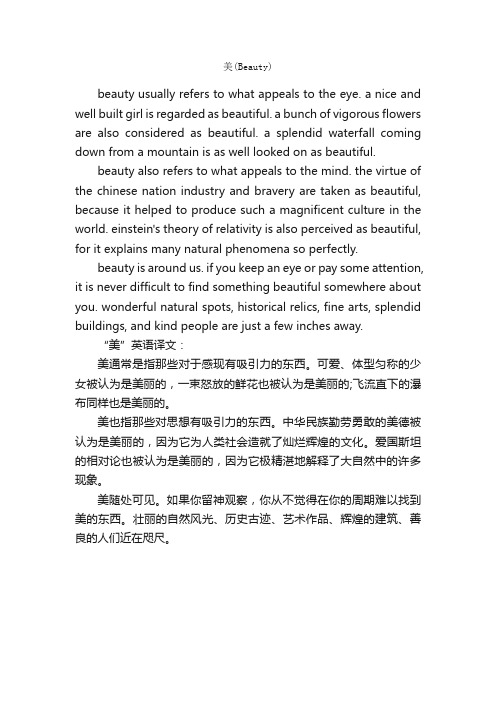
美(Beauty)beauty usually refers to what appeals to the eye. a nice and well built girl is regarded as beautiful. a bunch of vigorous flowers are also considered as beautiful. a splendid waterfall coming down from a mountain is as well looked on as beautiful.beauty also refers to what appeals to the mind. the virtue of the chinese nation industry and bravery are taken as beautiful, because it helped to produce such a magnificent culture in the world. einstein's theory of relativity is also perceived as beautiful, for it explains many natural phenomena so perfectly.beauty is around us. if you keep an eye or pay some attention, it is never difficult to find something beautiful somewhere about you. wonderful natural spots, historical relics, fine arts, splendid buildings, and kind people are just a few inches away.“美”英语译文:美通常是指那些对于感现有吸引力的东西。
初中英语日记范文:True Beauty (带中文翻译)

初中英语日记范文:True Beauty (带中文翻译)每个人都会被美所吸引,荚有强大的力量。
但是什么是真正的美呢?或许你可以从下面的事情中得到答案。
今天早上我和父母一起去市场买蔬菜,路上我们都赞叹一个西装革履的正骑车经过的年轻人。
但是他骑得太快了,不小心把一位老妇人撞倒在地。
而他却假装没看到,飞快地骑走了。
我们都生那个年轻人的气。
让人欣慰的是,一个穿着朴素的女孩立刻跑过来,扶起老人并把她送回了家。
我们都夸奖这个小女孩。
由此我们知道了,不能通过外表来判断一个人。
一个身穿华服的人可能没有美好的心灵,拥有美丽灵魂的人才是真正美丽的。
true beautyeveryone is attracted by beauty and beauty is powerful. but what is true beauty? perhaps you can get the answer from the following story.this morning i went to the market to buy some vegetables with my parents. on the way we all highly praised a young man in western-style clothes and leather shoes who was riding by. but he rode so fast that he knocked an old lady down carelessly.instead of stopping, he pretended not to see this and rode away quickly. we were all very angry with the young man. to our happiness, a girl in plain dress ran forward at once, helped the lady up and took her home.we all praised the girl.from this we know we cannot judge a person by his appearance. a person who is dressed beautifully may not have a beautiful soul. only a person who has a beautiful soul is really beautiful.。
新编英语教程6 U7 beauty中英对照

A beautiful woman, we say in English. But a handsome man. “Handsome” is the masculine equivalent of-and refusal of-a compliment which has accumulate certain demeaning overtones, by being resolved women only. That one can call a man in French and in Italian suggests that catholic countries, unlike those countries shaped by the Protestant version of Christianity, still retain some vestiges of the pagan admiration for beauty. But the differences, if one exists, is of degrees only. In every modern country that is Christian or post-Christian, women are the beautiful sex to the detriment of the notion of beauty as well as of women. To be called beautiful is thought to name something essential to women’s character and concerns. (In contrast to men whose essence is to be strong or competent). It doesn’t take someone in the throes of advanced feminist awareness to perceive that the way women are taught to be involved with beauty encourages narcissism, reinforces dependence and immaturity. Everybody (women and men) knows that. For it is ”every body”, a whole society, that has identified with caring about what one is and does and only secondarily, if at all, about how one looks.) Given these stereotype, it is on wonder that beauty enjoys, at best, a rather mixed reputation.一个美丽的女人,我们在英语中是这么说的。
大学英语4关于Beauty的作文(中英)
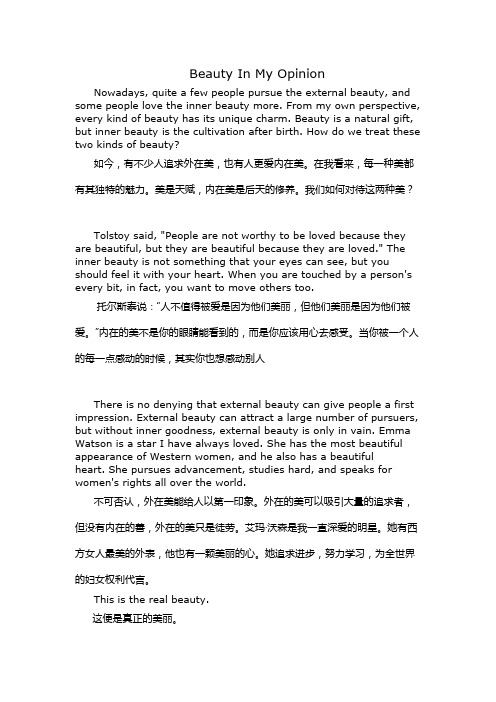
Beauty In My OpinionNowadays, quite a few people pursue the external beauty, and some people love the inner beauty more. From my own perspective, every kind of beauty has its unique charm. Beauty is a natural gift, but inner beauty is the cultivation after birth. How do we treat these two kinds of beauty?如今,有不少人追求外在美,也有人更爱内在美。
在我看来,每一种美都有其独特的魅力。
美是天赋,内在美是后天的修养。
我们如何对待这两种美?Tolstoy said, "People are not worthy to be loved because they are beautiful, but they are beautiful because they are loved." The inner beauty is not something that your eyes can see, but you should feel it with your heart. When you are touched by a person's every bit, in fact, you want to move others too.托尔斯泰说:“人不值得被爱是因为他们美丽,但他们美丽是因为他们被爱。
”内在的美不是你的眼睛能看到的,而是你应该用心去感受。
当你被一个人的每一点感动的时候,其实你也想感动别人There is no denying that external beauty can give people a first impression. External beauty can attract a large number of pursuers, but without inner goodness, external beauty is only in vain. Emma Watson is a star I have always loved. She has the most beautiful appearance of Western women, and he also has a beautifulheart. She pursues advancement, studies hard, and speaks for women's rights all over the world.不可否认,外在美能给人以第一印象。
(完整word版)beauty译文
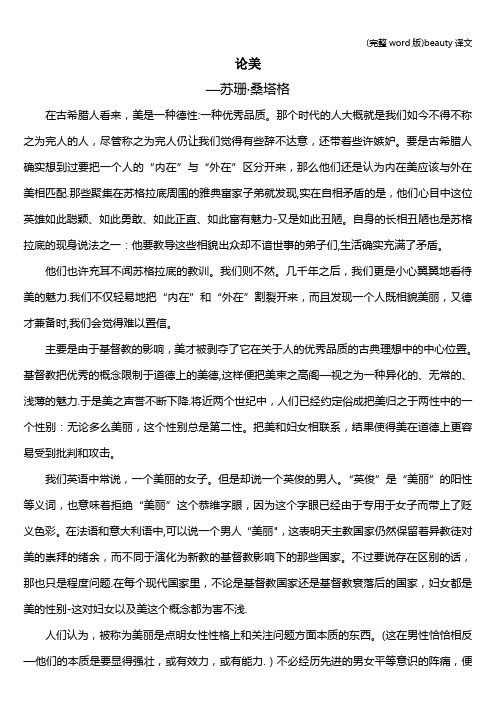
论美—苏珊·桑塔格在古希腊人看来,美是一种德性:一种优秀品质。
那个时代的人大概就是我们如今不得不称之为完人的人,尽管称之为完人仍让我们觉得有些辞不达意,还带着些许嫉妒。
要是古希腊人确实想到过要把一个人的“内在”与“外在”区分开来,那么他们还是认为内在美应该与外在美相匹配.那些聚集在苏格拉底周围的雅典富家子弟就发现,实在自相矛盾的是,他们心目中这位英雄如此聪颖、如此勇敢、如此正直、如此富有魅力-又是如此丑陋。
自身的长相丑陋也是苏格拉底的现身说法之一:他要教导这些相貌出众却不谙世事的弟子们,生活确实充满了矛盾。
他们也许充耳不闻苏格拉底的教训。
我们则不然。
几千年之后,我们更是小心翼翼地看待美的魅力.我们不仅轻易地把“内在”和“外在”割裂开来,而且发现一个人既相貌美丽,又德才兼备时,我们会觉得难以置信。
主要是由于基督教的影响,美才被剥夺了它在关于人的优秀品质的古典理想中的中心位置。
基督教把优秀的概念限制于道德上的美德,这样便把美束之高阁—视之为一种异化的、无常的、浅薄的魅力.于是美之声誉不断下降.将近两个世纪中,人们已经约定俗成把美归之于两性中的一个性别:无论多么美丽,这个性别总是第二性。
把美和妇女相联系,结果使得美在道德上更容易受到批判和攻击。
我们英语中常说,一个美丽的女子。
但是却说一个英俊的男人。
“英俊”是“美丽”的阳性等义词,也意味着拒绝“美丽”这个恭维字眼,因为这个字眼已经由于专用于女子而带上了贬义色彩。
在法语和意大利语中,可以说一个男人“美丽",这表明天主教国家仍然保留着异教徒对美的崇拜的绪余,而不同于演化为新教的基督教影响下的那些国家。
不过要说存在区别的话,那也只是程度问题.在每个现代国家里,不论是基督教国家还是基督教衰落后的国家,妇女都是美的性别-这对妇女以及美这个概念都为害不浅.人们认为,被称为美丽是点明女性性格上和关注问题方面本质的东西。
(这在男性恰恰相反—他们的本质是要显得强壮,或有效力,或有能力.)不必经历先进的男女平等意识的阵痛,便能认识到,教会妇女把自己和美联系起来,这就是助长自恋倾向,加深依赖性和不成熟状态。
关于beauty的英文作文

关于beauty的英文作文英文:Beauty is a subjective concept that varies from person to person. For me, beauty is not just about physical appearance, but also about personality and inner qualities.A person who is kind, compassionate, and empathetic is beautiful to me, regardless of their physical features.In terms of physical appearance, I appreciate natural beauty and simplicity. I believe that less is more, andthat a person who takes care of themselves and presents themselves in a clean and neat manner is attractive. However, I also recognize that beauty standards are constantly changing and influenced by societal norms.It is important to remember that beauty should not be the sole focus of our lives. While it is natural to want to look and feel our best, it is also important to focus on developing our inner selves and cultivating positiverelationships with others.中文:美是一个因人而异的主观概念。
《beauty》(译文)
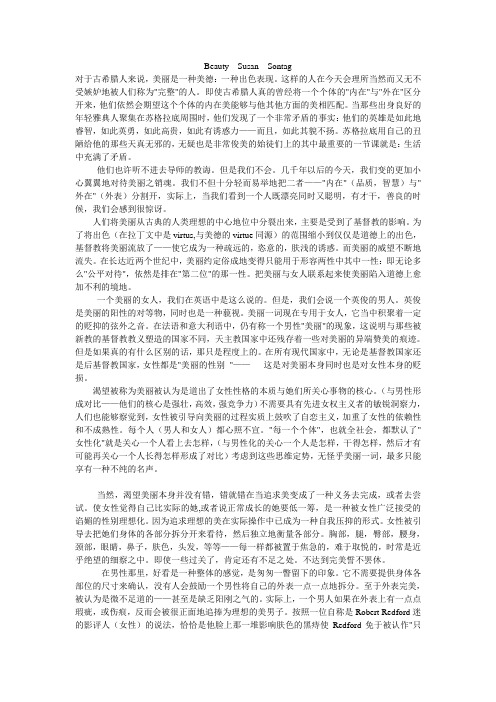
Beauty Susan Sontag对于古希腊人来说,美丽是一种美德:一种出色表现。
这样的人在今天会理所当然而又无不受嫉妒地被人们称为"完整"的人。
即使古希腊人真的曾经将一个个体的"内在"与"外在"区分开来,他们依然会期望这个个体的内在美能够与他其他方面的美相匹配。
当那些出身良好的年轻雅典人聚集在苏格拉底周围时,他们发现了一个非常矛盾的事实:他们的英雄是如此地睿智,如此英勇,如此高贵,如此有诱惑力——而且,如此其貌不扬。
苏格拉底用自己的丑陋给他的那些天真无邪的,无疑也是非常俊美的始徒们上的其中最重要的一节课就是:生活中充满了矛盾。
他们也许听不进去导师的教诲。
但是我们不会。
几千年以后的今天,我们变的更加小心翼翼地对待美丽之销魂。
我们不但十分轻而易举地把二者——"内在"(品质,智慧)与"外在"(外表)分割开,实际上,当我们看到一个人既漂亮同时又聪明,有才干,善良的时候,我们会感到很惊讶。
人们将美丽从古典的人类理想的中心地位中分裂出来,主要是受到了基督教的影响。
为了将出色(在拉丁文中是virtus,与美德的virtue同源)的范围缩小到仅仅是道德上的出色,基督教将美丽流放了——使它成为一种疏远的,恣意的,肤浅的诱惑。
而美丽的威望不断地流失。
在长达近两个世纪中,美丽约定俗成地变得只能用于形容两性中其中一性:即无论多么"公平对待",依然是排在"第二位"的那一性。
把美丽与女人联系起来使美丽陷入道德上愈加不利的境地。
一个美丽的女人,我们在英语中是这么说的。
但是,我们会说一个英俊的男人。
英俊是美丽的阳性的对等物,同时也是一种藐视。
美丽一词现在专用于女人,它当中积聚着一定的贬抑的弦外之音。
在法语和意大利语中,仍有称一个男性"美丽"的现象,这说明与那些被新教的基督教教义塑造的国家不同,天主教国家中还残存着一些对美丽的异端赞美的痕迹。
TrueBeauty(真正的美)_高中英语作文
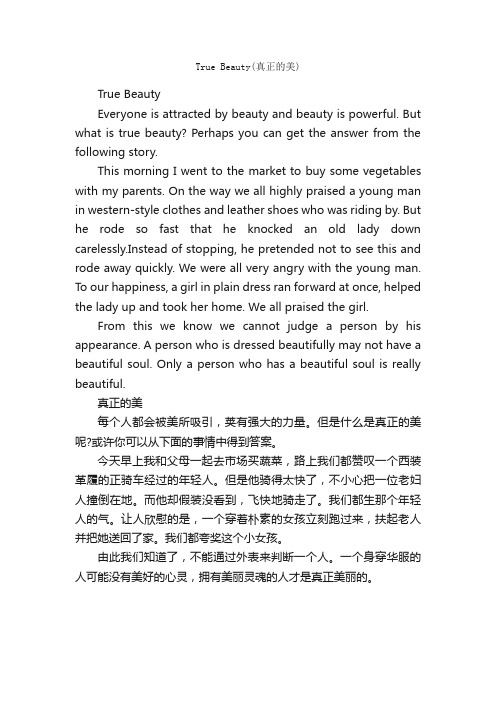
True Beauty(真正的美)True BeautyEveryone is attracted by beauty and beauty is powerful. But what is true beauty? Perhaps you can get the answer from the following story.This morning I went to the market to buy some vegetables with my parents. On the way we all highly praised a young man in western-style clothes and leather shoes who was riding by. But he rode so fast that he knocked an old lady down carelessly.Instead of stopping, he pretended not to see this and rode away quickly. We were all very angry with the young man. To our happiness, a girl in plain dress ran forward at once, helped the lady up and took her home. We all praised the girl.From this we know we cannot judge a person by his appearance. A person who is dressed beautifully may not have a beautiful soul. Only a person who has a beautiful soul is really beautiful.真正的美每个人都会被美所吸引,荚有强大的力量。
beauty译文之欧阳史创编

论美—苏珊·桑塔格在古希腊人看来,美是一种德性:一种优秀品质。
那个时代的人大概就是我们如今不得不称之为完人的人,尽管称之为完人仍让我们觉得有些辞不达意,还带着些许嫉妒。
要是古希腊人确实想到过要把一个人的“内在”与“外在”区分开来,那么他们还是认为内在美应该与外在美相匹配。
那些聚集在苏格拉底周围的雅典富家子弟就发现,实在自相矛盾的是,他们心目中这位英雄如此聪颖、如此勇敢、如此正直、如此富有魅力—又是如此丑陋。
自身的长相丑陋也是苏格拉底的现身说法之一:他要教导这些相貌出众却不谙世事的弟子们,生活确实充满了矛盾。
他们也许充耳不闻苏格拉底的教训。
我们则不然。
几千年之后,我们更是小心翼翼地看待美的魅力。
我们不仅轻易地把“内在”和“外在”割裂开来,而且发现一个人既相貌美丽,又德才兼备时,我们会觉得难以置信。
主要是由于基督教的影响,美才被剥夺了它在关于人的优秀品质的古典理想中的中心位置。
基督教把优秀的概念限制于道德上的美德,这样便把美束之高阁—视之为一种异化的、无常的、浅薄的魅力。
于是美之声誉不断下降。
将近两个世纪中,人们已经约定俗成把美归之于两性中的一个性别:无论多么美丽,这个性别总是第二性。
把美和妇女相联系,结果使得美在道德上更容易受到批判和攻击。
我们英语中常说,一个美丽的女子。
但是却说一个英俊的男人。
“英俊”是“美丽”的阳性等义词,也意味着拒绝“美丽”这个恭维字眼,因为这个字眼已经由于专用于女子而带上了贬义色彩。
在法语和意大利语中,可以说一个男人“美丽”,这表明天主教国家仍然保留着异教徒对美的崇拜的绪余,而不同于演化为新教的基督教影响下的那些国家。
不过要说存在区别的话,那也只是程度问题。
在每个现代国家里,不论是基督教国家还是基督教衰落后的国家,妇女都是美的性别—这对妇女以及美这个概念都为害不浅。
人们认为,被称为美丽是点明女性性格上和关注问题方面本质的东西。
(这在男性恰恰相反—他们的本质是要显得强壮,或有效力,或有能力。
- 1、下载文档前请自行甄别文档内容的完整性,平台不提供额外的编辑、内容补充、找答案等附加服务。
- 2、"仅部分预览"的文档,不可在线预览部分如存在完整性等问题,可反馈申请退款(可完整预览的文档不适用该条件!)。
- 3、如文档侵犯您的权益,请联系客服反馈,我们会尽快为您处理(人工客服工作时间:9:00-18:30)。
U13 BeautyFor the Greeks, beauty was a virtue: a kind of excellence. Persons then were assumed to be what we now have to call---lamely, enviously--- whole person. If it did occur to the Greeks to distinguis h between a person’s “inside” and “outside”, they still expected that inner beauty would be matched by beauty of the other kind. The well-born young Athenians who gathered around Socrates found it quite parad oxical that their hero was so intelligent, so brave, so honorable, so seductive ---- and so ugly. One of Socrates’ main pedagogical acts was to be ugly ---- and teach those innocent, no doubt splendi d-looking disciples of his how full of paradoxes life really was. 美之于古希腊人是一种德性一种美德。
今天看来他们就是我们如今所谓的“全面的人”虽然这个称呼有点不理直气壮,并且带有嫉妒之意。
倘若让古希腊人区分一个人的“内在”和“外在”他们仍期望内在美是需要与其他种类之美相匹配的。
那些聚集在苏格拉底身边的雅典青年人发现自己的偶像是如此得聪慧、勇敢、正直、充满诱惑力而同时又那么得丑这是多么自相矛盾啊。
而苏格拉底主要的教学手段之一即为“丑”告诉这些天真却拥有毋庸置疑般美貌的门生真正的人生是充满悖论的。
They may have resisted Socrates’ lesson. We do not. Several thousand years later, we are more wary of the enchantments of beauty. We not only split off ---- with the greatest facility ---- the “i nside” (character, intellect) from the “outside” (looks); but we are actually surprised when so meone who is beautiful is also intelligent, talented, good.他们或许能够抗拒苏格拉底的学说。
而我们做不到。
几千年以后.美的魅惑使我们更加疲惫。
我们不仅仅用最容易的方式将“内在”(性格,心智)和“外在”(外貌)割离开来.同时我们也对那些既有美貌亦有智慧天赋之人,感到诧异。
It was principally the influence of Christianity that deprived beauty of the central place it had in cl assical ideals of human excellence. By limiting excellence (virtus in Latin) to moral virtue only, C hristianity set beauty adrift ---- as an alienated, arbitrary, superficial enchantment. And beauty has continued to lose prestige. For close to two centuries it has become a convention to attribute beaut y to only one of the two sexes: the sex which, however Fair, is always Second. Associating beauty with women has put beauty even further on the defensive, morally.美在古典时期是理想的人类美德,而将其从这中心位置赶走的首要原因来自基督教的影响。
通过美德(拉丁语为virtus)的概念限定到仅仅指伦理道德的范畴,基督教放逐了“美”——它成为一种异化的,武断的,肤浅的诱惑。
同时美不断丢失了它原本的名声。
到二世纪末的时候,美成为一种既定概念,仅用于修饰两性之的一个性别:这个性别虽然是悦目的,但却处于第二位。
将美与女性联系起来,使得美的概念在道德层面上更加脆弱。
A beautiful woman, we say in English. But a handsome man. “Handsome” is the masculine equ ivalent of ---- and refusal of ---- a compliment which has accumulated certain demeaning overtone s, by being reserved for women only. That one can call a man“beautiful”in French and in Italian suggests that Catholic countries ---unlike those countries shaped by the Pr otestant version of Christianity---still retain some vestiges of the pagan admiration for beauty. But the difference, if one exists,is of degree only. In every modern country that is Christian or post-Chr istian, women are the beautiful sex ---- to the detriment of the notion of beauty as well as of wome n. 在英语里,我们说一位女子是美丽的。
但是我们却说一位男子是英俊的。
“英俊”是其阳性的等同词,同时拒绝一种带有某些贬义暗示的赞扬,而这种赞扬是仅用于女性的。
在法语和意大利语里,人们可以称男子是“美丽的”,这暗示着这些天主教国家依旧保留了前基督教时期欣赏“美”的痕迹,而这些痕迹在新教国家中已经荡然无存。
但即使存在,差别也只是程度不同而已。
在任何一个基督教或者后基督教国家里,女性就是那个美丽的性别——既损害了美这个概念,也损害了女性这个概念。
To be called beautiful is thought to name something essential to women’s character and concerns. (In contrast to men ---- whose essence is to be strong, or effective, or co mpetent.) It does not take someone in the throes of advanced feminist awareness to perceive that t he way women are taught to be involved with beauty encourages narcissism, reinforces dependenc e and immaturity. Everybody (women and men) knows that. For it is “everybody”, a whole soci ety, that has identified being feminine with caring about how one looks. (In contrast to being masc uline ---- which is identified with caring about what one is and does and only secondarily, if at all, about how one looks.) Given these stereotypes, it is no wonder that beauty enjoys, at best, a rather mixed reputation.被称为“美”意味着要列举出一些对女性来说必要的特征和她们所关心的事物。
(和男性不同,他们的核心是强壮、有效率,或者有能力。
)那些拥有超前女性意识的人将很容易就能感受到,让女性和“美”联系起来,会助长她们孤芳自赏的态度也会让她们更加有依赖性且不成熟。
所有人(女性和男性)都认识到这点。
因为“所有人”,整个社会,都很明确,作为女性就应该关心长相。
(作为男性则不同:他们身份的确认是关注于某人是谁,做什么的,而长相即使并非一无是处,至少也是其次的。
)有了这些老套的看法,我们就不难明白, 即使从最好的方面来看,为什么“美”也有着褒贬不一的名声。
It is not, of course, the desire to be beautiful that is wrong but the obligation to be ---- or to try. Wh at is accepted by most women as a flattering idealization of their sex is a way of making women fe el inferior to what they actually are ---- or normally grow to be. For the ideal of beauty is administ ered as a form of self-oppression. Women are taught to see their bodies in parts, and to evaluate ea ch part separately. Breasts, feet, hips, waistline, neck, eyes, nose, complexion, hair, and so on ---- e ach in turn is submitted to an anxious, fretful, often despairing scrutiny. Even if some pass muster, some will always be found wanting. Nothing less than perfection will do.当然,对美的崇拜并没有什么错,错就错在认为美是一种义务,并且试图想要变美。
